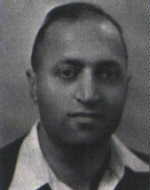Sher-Shalom Cohen, Shimon
Son of Shaul and Hannah. He was born in Jerusalem on June 7, 1927, and studied at the “Doresh Zion” elementary school in his hometown, where he devoted great time to preparing boys for mitzvot, taught them the laws of putting on phylacteries, Every day he would devote two or three hours to this important enterprise in his home, or in the synagogue, and sometimes he went to his student’s house, all for heaven’s sake, not to receive a reward, and if we sent him a bouquet of flowers in appreciation He would return the sender to avoid harming his mitzva, but he would gladly accept the invitation of the parents to the meal of the mitzva and would try to make the people Simcha And in his free time he was an assistant in the public affairs of the Shaarei Rachamim Association – in the provident funds and in charity funds. In the week before Pesach, he was modestly and respectfully providing support to the poor households with his own hands (in the form of money, meat, and wine), and he worked in the Hebrew University archives. He was especially concerned about the progress of young men in their first steps at work. After all his brothers and sisters married and established homes in Israel he remained with his mother and his love and devotion to her also rejected marriage proposals. In mid-May 1948, at the height of the War of Independence, he was drafted into the IDF and assigned to the Intelligence Corps, and after his discharge he was called to reserve duty at the end of August 1971. On the 18th of Elul, 1971.) Rabbi Shimon died in his illness and was brought to eternal rest in the cemetery on Mount Herzl in Jerusalem, and his family commemorated him in the following ways: his private apartment was dedicated to the Sha’arei Rachamim Association and its income – Was brought along with a bag and a pair of hand grenades to the Shaarei Rachamim Yeshiva in Jerusalem, the yeshiva of his grandfather, Rabbi Rachamim Melamed zt “l In his name to grant interest-free loans to the needy and to young couples; Many holy books were purchased and dedicated to synagogues where the deceased was accustomed to praying and visiting.
